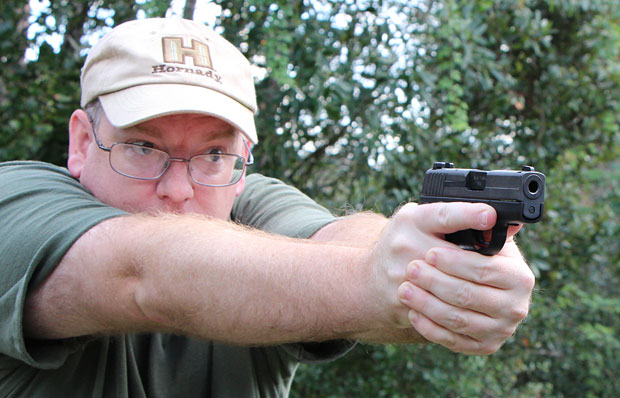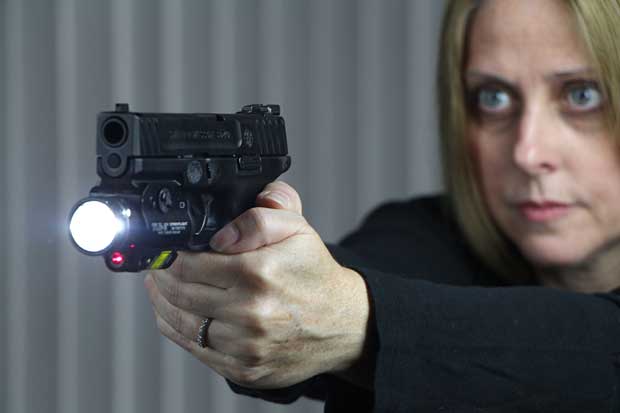When it comes to choosing the right defensive handgun, there are many “right” answers and a few wrong ones. The best defensive handgun for you will likely be different than my choices. But the criteria in picking a handgun for self defense is fairly universal.
Let’s take a look at some of the things you should consider when buying a handgun for personal protection.
Caliber selection is important, but not that important…
When picking the right handgun, many people obsess about what caliber to choose. Generally speaking, handguns are poor choices for stopping a violent attacker. Handguns launch a fairly small projectile at relatively low velocities, and bullet wounds to areas other than the central nervous system (CNS) generally take time to work.
So, two things are important when considering which caliber. First, bigger is better…to a point. A high-quality .45 hollowpoint is more likely to be effective than a .25 ACP anything. The .45 delivers more energy and momentum, and it makes a significantly larger wound channel.
However, with modern defensive ammunition, 9mm, .40 S&W, .45 ACP, .38 SPL and the like all make good choices. Police officers and citizens alike save themselves and others on a regular basis with these rounds. Yes, the mighty .22 LR has saved a few lives, but not with the consistency of these more considerable rounds.
The second thing to consider when selecting a caliber is ‘only hits count.’ In other words, a hit with that .25 is more effective than a miss with a .45.
So when selecting a caliber, there is a balancing act of power and controllability. Many people find the 9mm easier to control that the .40 or .45. Additionally, the 9mm ammunition tends to be less expensive than other calibers, so regular practice is more affordable.
Find a gun that fits…you
One of the common mistakes that people make is buying a defensive handgun for someone else. Typically, this is a husband buying a gun for his wife. This may be well intentioned, but is generally a bad idea.

Hand to gun fit is very important. A good match between handgun and hand size will allow better trigger control, natural pointing and increased confidence.
We’ve all picked up a gun that did not feel right in our hands. If you shot that gun, you probably didn’t do very well with it, and you likely haven’t shot it much since.
If you are looking for a self-defense gun, you need to be confident with its use, which means you need to practice frequently. If the gun doesn’t fit your hand, you are unlikely to shoot it often, if ever.
If you are looking for a gun for your own use, find a way to shoot several different brands of firearms prior to purchase. Many gun ranges rent firearms, which would allow you to test-drive them. You can also find a firearms instructor in your area to go to the range. The instructor can bring a variety of handguns with him or her to let you shoot. Of course, finding a friend with several guns is also an option.
If you are looking to buy a defensive handgun for your spouse, mother, or someone else…don’t. The best thing you can do is to buy them time with an instructor or at a range so they can discover what works best for them.
We’ve all heard about the guy who wants to buy a small revolver for his wife, right. Well, my first wife bought a Sig P220 .45 ACP for carry and my current (and final) wife loves the Glock 19 9mm. Neither cares anything for revolvers or small guns. Moral of the story…let them pick.
Small guns are expert guns
Small guns are easier to conceal but can be much harder to shoot. When compared to their larger framed brethren, small guns typically don’t fit the hand as well, have smaller sights and have harsher recoil. In a fight for your life, these things put you at a disadvantage.
The harsh recoil means you are not likely to practice often. Smaller sights are harder to see, especially under stress. And, if the gun doesn’t fit the hand well, proper trigger control is unlikely. All of these problems are magnified in the stress of combat.
Larger guns are harder to conceal but are easier to shoot. I would suggest that it is easier to learn to dress around a medium-sized gun than to learn to shoot a small gun as accurately.
Think reliability
You must have a gun that is reliable. A $2000 handgun that won’t reliably feed hollowpoints is worthless, and a $200 pistol that malfunctions is no bargain. In a self-defense situation, you must have a working gun. If your gun goes ‘click’ instead of ‘bang’, you may not survive.
By test firing different handguns before purchase, you can get a good idea of which pistols may be most reliable. You can also cruise the Internet forums to get feedback on different firearms, but nothing beats the ‘hands-on’ approach.
We all have budgets, but we are talking about your life and the lives of your loved ones. When you find the gun that fits you and is reliable, but is outside of your budget, don’t feel you have to settle for something less. Many gun shops will let you purchase the firearm on a layaway plan.
And, don’t ignore the possibility of buying used. A friend of mine just picked up a full-size Smith & Wesson M&P 40 with night sights and three magazines for only $299. The gun was a police trade-in with very little use and virtually no visible wear.
After you buy your handgun, you have to make sure it is completely reliable with your self-defense ammunition. Some guns do not work well with some types of ammo. The middle of a gunfight is the wrong time to make this discovery.
I suggest running at least 200 rounds of your self-defense loads through the gun to determine if that combination of gun and ammo is reliable. If it is not, try another brand or style of ammunition.
Final thoughts
Buying a personal protection handgun is a very individual decision. Make sure the gun fits your hand and is reliable with your ammo. Do not stress over caliber selection.
Whatever you get, invest in quality self-defense instruction, and practice!

6 replies on “Some Thoughts on Choosing a Defensive Handgun”
this is an excellent piece of article for a lay man like me. got a clear idea what to purchase as a defensive weapon and it will definitely help me to choose the next right one for me. was planning to present my girlfriend a .38acp pistol which i won’t do now without her finding out the right one for herself! you saved me from making a life risking blunder! readers welcome this sort of practical readings and expect more regularly. thanks very much.
Raj,
Thanks for the comments. Instead of the gun as a present, maybe a training class would be a good gift? Or credit at a local gun shop?
Thanks again,
Richard
Hi Richard,
I found this website about 2 months ago and have really enjoyed it. Articles like this one are really what us civilian sheepdogs need! Thank you for taking the time to put this site together for us to read and learn. I also found your other site bluesheepdog.com ….do you have any other sites you write in?
Best Wishes,
Tico
Thanks for stopping by, Tico. This and BlueSheepdog.com are the only two sites I am writing for right now. I’ve got plans for some more things in the future, like video reviews, but nothing set in stone right now.
Thanks and stay safe!
Richard
Nice article, Thanks. 200 rounds of my self defense ammo? Wow, I paid $24.00 for 24 rounds of my hollow points. It will cost me about $200 to test 200 rounds for my Beretta PX4 storm. I have been using at the range the cheaper 45 cent a round “target” ammo. Again thanks.
I like what I’m reading. This is a must to pass on to others. I too am guilty of the buy and try method. My wife hated her S&W Air Weight 38+P but loves her Ruger 380LCP. We do have a indoor range that rents guns. They also have a ladys night at half price. We need more ranges like these with good attitudes toward the public. I do not like it when someone trys to make me feel stupid for asking a question about any product. KEEP UP THE GOOD WORK !!!!!